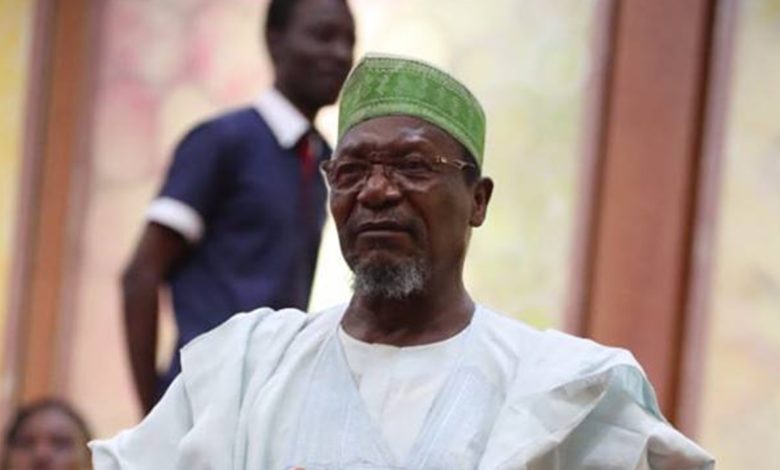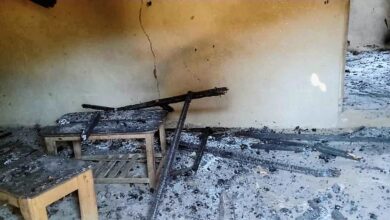Lack Of Respect For Legislature Fueling Insecurity In Nigeria ― Lawmakers

Nigerian federal lawmakers cite disregard for the legislature by members of the executive branch, including security officials, as one of the reasons for unending insecurity in the country.
Speaking on Saturday during a webinar held by the Whiteink Institute for Strategy Education and Research (WISER), Abdullahi Yahaya, Senate Majority Leader and former Associate Professor at Ahmadu Bello University, urged the executive to pay more attention to federal lawmakers.
“The major issue is that the executive has the greatest responsibility for taking care of security issues.
“The legislature is mainly concerned with representation, legislation, and oversight.
“There is a limit to the extent to which the legislature can intervene in governance especially because the implementation side is always on the side of the executive,” he observed.
“So unless the executive really listens to the legislature, listens to the voice of those who have been elected to represent people in the legislature, there is always that kind of difference,” he added.
He said numerous resolutions, laws, and amendments passed by the National Assembly related to security had not been implemented.
The lawmaker added that it appears “there is some form of lukewarm attitude that the executive exhibits or there isn’t much confidence in the legislature that it is composed of intensely patriotic Nigerians who also have a responsibility to the Nigerian people”.
He complained that little has changed in the country’s security architecture in terms of training, welfare, management, equipment, and manpower.
For example, he said, there is any local government area especially in the northern region that has over 20o policemen who are “free, on duty, well-armed, and trained”.
“Go to our police training institutions, all of them are in terrible shape. We have to go back and look at the architecture itself.
“How do we govern the Nigerian space given the complexity, both the ecological and social, that has emerged since 1967?” he asked.
“The issue of central coordination of the security architecture is completely absent. These institutions are there, but what is required is to get the necessary political will and understanding to make them work properly.
“And for them to work properly, you need to have confidence in the governing institutions. The governing institutions must trust each other. There is a lack of trust and consultation,” he added.
Speaking at the same event, Nnenna Elendu-Ukeje, who represents Bende Federal Constituency at the House of Representatives, said aside from the over-politicisation of issues related to security, “another problem is the lack of respect for the resolutions of the National Assembly”.
“There have been so many resolutions with regards to the security apparatus and yet we find that the executive arm of the government that has the powers to carry out the reforms that we seek has absolutely no respect for the reforms,” she added.
She gave as examples the non-signing of the “Military Intervention Fund” meant to innovatively address funding shortages in the anti-terrorism fight and the acquisition of 12 Super Tucano aircraft in 2018 without prior approval from the National Assembly.
“We believe that, by the very nature of the military, they have a way of excluding every other institution and every other institution that tries to intervene especially with regard to their sector reforms are viewed as meddlesome interlopers and people who are coming out to snuff out the energy in the space,” said Elendu-Ukeje.
“So, when people speak that the National Assembly has been unable to carry out these public sector reforms, I think that [one of] the challenges that the National Assembly is faced with are the secrecy of the security apparatus.”
She pointed out that a second challenge is the lack of experience of some lawmakers who have not served for long enough to acquire enough expertise to effectively carry out oversight functions.
“Another issue is politicisation. Politicians would ordinarily tilt towards their party policies and regional cleavages, and so that also makes for some kind of hindrance to wholesale reform within the political sector.
“This is because when you find out that there are yawning gaps within the security apparatus and people want to speak up about it, they are normally constrained by their political leanings because they don’t want to be viewed as disloyal to their parties,” she added.
Other panellists who spoke during the webinar included Dr Temitope Oriola, Associate Professor of Criminology and Sociology at the University of Alberta; Prof Habu Galadima, Director General of the National Institute for Policy and Strategic Studies; and Dr Mark Downes, Assistant Director and Head of Operations at the Geneva Center for Security Sector Governance.
Likewise at the event were Lt. Gen. Chikadibia Isaac Obiakor, former military adviser for Peacekeeping Operations and former Force Commander of the United Nations Mission in Liberia; Dr Hakeem Baba-Ahmed, former Permanent Secretary at the Foreign Affairs Ministry; Dr Mahmoud Yayale Ahmed, former Defence Minister and Secretary to the Government of the Federation; and Mohammed Ndatsu Umaru, a former military governor of Kwara and Kano states.
Support Our Journalism
There are millions of ordinary people affected by conflict in Africa whose stories are missing in the mainstream media. HumAngle is determined to tell those challenging and under-reported stories, hoping that the people impacted by these conflicts will find the safety and security they deserve.
To ensure that we continue to provide public service coverage, we have a small favour to ask you. We want you to be part of our journalistic endeavour by contributing a token to us.
Your donation will further promote a robust, free, and independent media.
Donate Here




